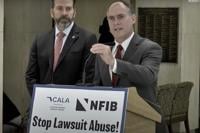
Jamie Cole
Deltona has become the sixth Florida city to join a proposed lawsuit to challenge provisions of a new law that critics say ties the hands of local governments seeking to enact more restrictive planning, zoning and development policies.
In a 4-3 on Aug. 18 vote, the Deltona City Commission voted to join the legal action, which has been championed by the Weiss, Serota, Helfman, Cole & Bierman law firm. The firm, which specializes in municipal issues, said it will represent Deltona in the lawsuit for a flat fee of $10,000 at the trial court level, $5,000 per district court appeal and $5,000 for appealing to the state Supreme Court.
The law firm said these costs were subject to the participation of at least 10 cities in the litigation, which partner Jamie Cole indicated would likely be filed by the middle of September.
“SB 180 represents the largest intrusion into home-rule authority for local governments since home rule was added to the state constitution in 1968,” Cole told the Florida Record. “... The new limitation in 180 makes it impossible for local governments to react to changing circumstances.”
During the commission meeting last week, commissioners who supported suing the state Legislature and Gov. Ron DeSantis said the new law prevents municipalities from imposing a temporary moratorium on development in order to address flooding and hurricane-related threats to the homes and businesses of local residents.
“The city's participation in this lawsuit would aim to seek declaratory, injunctive and other appropriate relief from the provisions of Senate Bill 180, which imposes a blanket statewide prohibition on the exercise of home rule authority concerning land use and zoning regulations,” city officials said in the minutes of the Aug. 18 meeting.
The Deltona City Attorney’s Office said in a memo that provisions of the bill are ambiguous, hard to understand and hinder the ability of local governments to act on pressing concerns.
“Senate Bill 180 contains vague prohibitions against moratoria on construction, reconstruction and redevelopment of properties, as well as land use and zoning regulations that are deemed ‘more restrictive or burdensome,’” the memo states.
But Commissioner Emma Santiago, who voted against joining the lawsuit, said such a legal action goes against the guidance she received at a recent Florida League of Cities conference, which advised: “Spend time developing relationships with legislators and stay out of the political fray.”
Most cities are working with state lawmakers to amend SB 180 rather than going the route of litigation, Santiago said, adding that suing could lead to dire impacts such as the loss of millions of dollars in state grants.
“We’re not going to win,” she predicted, if the city opts to join the lawsuit.
But supporters of joining the lawsuit countered that the new law’s ban on local development moratoriums hurts the city’s efforts to fix infrastructure problems and protect local residents from rain and flooding.
SB 180 imposes the restrictions on local government development policies from Aug. 1, 2024, to Oct. 1, 2027.
Cole noted in a recent blog post that the restrictions may seem limited because they apply only to counties identified in federal disaster declarations for hurricanes Debby, Helene and Milton. But those designations cover every county and city in Florida, according to Cole.
He also noted that the new law gives residents and businesses the authority to file civil lawsuits against local governments in the event the governments fail to repeal ordinances covered by SB 180.
“To enforce compliance, SB 180 empowers residents and businesses to bring civil actions against local governments to obtain declaratory and injunctive relief, along with recovery of attorneys’ fees and costs,” within a prescribed timeline, Cole said.






